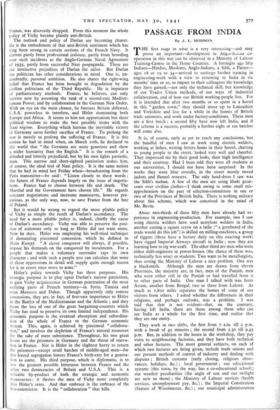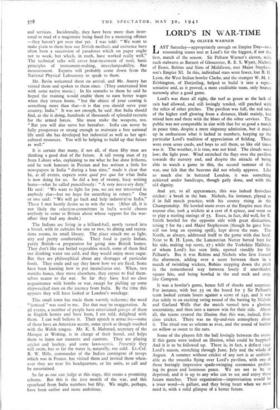PASSAGE FROM INDIA
By J. L. HODSON
THE first stage in what is a very interesting—and may prove an important—development in Ang,o-ludian co- operation in this war can be observed in a Ministry of Labour Training-Centre in the Home Counties. A fortnight ago fifty Indians—Hindus, Moslems, Anglo-Indians, a Sikh, a Parsee— ages 18 or 19 to 34—arrived to undergo further training in engineering-work with a view to returning to India in six months' time or so, to impart to their colleagues the knowledge they have gained,—not only the technical skill, but knowledge of our Trades Union methods, of our ways of industrial collaboration, and of how our British working-people live. For it is intended that after two months or so spent in a hostel in this " garden town," they should move up to Lancashire and Yorkshire and live for a while in the homes of British trade unionists, and work under factory-conditions. These men are a first batch ; a second fifty have now left India, and if the scheme is a success, probably a further eight or ten batches will come also.
It is, of course, early as yet to reach any conclusions, but the handful of men I saw at work using electric welders, working at lathes, writing letters home in their hostel, chatting to young people in the street, looked very well and cheerful. They impressed me by their good looks, their high intelligence and their courtesy. Had I been told they were all students at our universities, I should not have been surprised. In the works they wore blue overalls, in the street mostly tweed jackets and flannel trousers. The only head-dress I saw was the Sikh's turban. A few of the men are using khaki great- coats over civilian clothes—I think owing to some small mis- apprehension on the part of selection-committees in one or two of the Provinces of British India. There is nothing military about this scheme, which was conceived in the mind of Mr. Bevin.
About two-thirds of these fifty men have already had ex- perience in engineering-production. For example, two I saw using electric welders have used acetylene welders in India, another cutting a square screw on a lathe (" a greybeard of the trade would do this job") is skilled on milling-machines, a group of riggers (these have a lecture daily on this exacting work) have rigged Imperial Airways aircraft in India ; now they are learning how to rig war-craft. The other third are men who were either shift-engineers in power-houses (the choice of these was, technically less wise) or students. Two want to be metallurgists, thus setting the Ministry of Labour a nice problem. One was a blacksmith. Although the men are drawn from eleven Provinces, the majority are, in fact, men of the Punjab, men who were either still in the Punjab or had travelled from it to other parts of India. One man I talked with was from Assam, another from Bengal, two or three from Lahore. As much as 1,800 miles separates the homes of some of our visitors from others. I asked whether the differences in their religions, and perhaps outlooks, was a problem. I was told that that is not evident—that, on the contrary, having left India, there are those among them who can see India as a whole for the first time, and realise that they are one entity.
They work in two shifts, the first from 7 a.m. till 2 p.m. with a break of 45 minutes ; the second from 2.3o till 9.45 p.m. But, in addition to the hours in the workshop, they pay visits to neighbouring factories, and they have both technical and other lectures. The more general subjects, on each of which two lectures are being given, include trade unions and our present methods of control of industry and dealing with disputes ; British customs (early dosing, religious obser- vances, holidays, &c.) ; local government ; our educational systems (this town, by the way, has a co-educational school); our weather peculiarities (the angle of sun and our twilight are new to them) ; the Ministry of Labour services (health services, unemployment pay, &c.) ; the Imperial Constitution (Statute of Westminster, &c.) ; our municipal administration and services. Incidentally, they have been more than inter- ested to read of a magistrate being fined for a motoring offence —they haven't got over that yet. I was told : " We want to make plain to them how our British methods and existence have often been a succession of paradoxes which on paper ought not to work, but which, in truth, have worked really well." The technical talks will cover heat-treatment of steel, basic principles of instrument-making, interchangeability, fine measurement. Experts will probably come down from the National Physical Laboratory to speak to them.
Mr. Bevin welcomed them on arrival, and Mr. Amery has visited them and spoken to them since. (They entertained him with some native music.) In his remarks to them he said he hoped the training would enable them to earn better wages when they return home, " but the object of your coming is something more than that—it is that you should serve your country, India." It was not enough, he said, that India should find, as she is doing, hundreds of thousands of splendid recruits for the armed forces. She must make the weapons, too. " But you will also serve her hereafter. India can never be fully prosperous or strong enough to maintain a free national life until she has developed her industrial as well as her agri- cultural resources. You will be helping to build up that future as well."
It is certain that many, if not all, of these fifty men are thinking a good deal of the future. A tall young man of 23 from Lahore who, explaining to me what he has done hitherto, said he took honours in Persian and has written a little for newspapers in India " during a lean time," made it clear that he, at all events, expects some quid pro quo for what India is now doing for us. So did a boy of twenty, busy writing home—what he called punctiliously: " A very necessary duty." He said : We want to fight for you, we are not interested in anybody else—but we hope for something in return." One or two said: " We will go back and help industrialise India." Those I met keenly desire us to win the war. (After all, it is not likely the selection-committees in India would choose anybody to come to Britain about whose support for the war- effort they had any doubt.) The Indians are living in a billiard-hall, newly turned into a hostel, with its cubicles for one or two, its dining and recrea- tions rooms, its small library. The place struck me as light, airy and pretty comfortable. Their food is partly Indian, partly British—a preparation for going into British homes. They don't like our boiled vegetables much, some of them find our drinking water too cold, and they would enjoy more sugar. But they are philosophical about any shortages of particular foods. They smile and say they know how we are fixed. Some have been learning how to put incendiaries out. When, two months hence, they move elsewhere, they expect to find them- selves nearer to the war. So far they have had no close acquaintance with bombs or war, except for picking up some shipwrecked men on the journey from India. By the time this appears they will have looked at London's wreckage.
This small town has made them warmly welcome; the word " lionised " was used to me_ But that may be exaggeration. At all events, a number of people have entertained groups of them in English homes and have been, I am told, delighted with them. I can well believe it. Their speech is attracive—some of them have an American accent, some speak as though touched with the Welsh tongue. Mr. K. S. Mahmud, secretary of the Mosque at Woking, is in charge of their hostel, and helps them to learn our manners and customs. They are playing cricket and hockey, and some lawn-tennis. Presently they will swim, but so far the water is, naturally, too cold. Lt.-Col. R. W. Hills, commander of the Indian contingent of troops which was in France, has visited them and invited them when- ever they are near his headquarters, or his units, to call and be entertained.
So far as one can judge at this stage, this seems a promising scheme. But this is the 21st month of the war, and this spearhead from India numbers but fifty. We might, perhaps, have been earlier and more ambitious.































 Previous page
Previous page